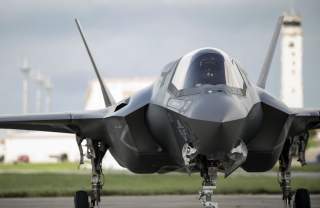No, Israel's Stealth F-35 (Probably) Did Not Fly over Iran
Or did it? You make the call.
A Kuwaiti newspaper created a stir earlier this month when it reported that Israel's new F-35 stealth fighters had flown over Iran.
"The fighters crossed Syrian airspace into Iraqi airspace, including to Iran, where they carried out reconnaissance missions and targets in the areas of Bandar Abbas, Isfahan and Shiraz, flying at a high altitude over other sites suspected of a relationship with Iran's nuclear program," according to an "informed source" quoted by the newspaper Al-Jarida (Google Arabic translation here).
The F-35s were allegedly not detected either by Iran or Russian radar based in Syria, according to the article.
So did the incident really happen? First, if the incident were true, that would mean that operational missions are already being flown by the F-35I Adir ("Mighty"), the Israeli version of the Lockheed Martin fighter. Israel currently has only nine of them, and the first squadron was was declared operational only late last year. The Israeli Air Force (IAF) has a well-earned reputation for boldness, but there is a difference between being bold and foolhardy. IAF pilots and planners have barely had time to acclimate to a fifth-generation aircraft different from the fourth-generation F-15s and F-16s they currently operate. Even the U.S. military is struggling to fix numerous bugs in the F-35.
Recommended: How Israel Takes U.S. Weapons and Makes Them Better.
Recommended: North Korea’s Most Lethal Weapon Isn’t Nukes.
Recommended: 5 Worst Guns Ever Made.
The baseline F-35A has a combat radius of around 600 miles (external fuel tanks add range but compromise stealth). The direct route from Tel Aviv to Tehran, which would overfly Jordan and Iraq, is about a thousand miles. The F-35I includes several unique modifications, including special external fuel tanks being developed by Israel. Yet even with air-to-air refueling, for which the IAF has a limited tanker capability, reaching Iran would still be a taxing flight on a par with the risky 1981 raid on Iraq's Osirak reactor.
Not to mention Iran has its own air defenses, including Russian-made S-300 long-range anti-aircraft missiles. Israel's enemies rejoiced when the IAF lost an F-16 to Syrian anti-aircraft missiles in February. Imagine the propaganda coup if Iran shot down an F-35.
Besides the technical risks, there is a bigger question: why fly the mission at all? Tensions are high, and predictions of war nigh, between Israel versus Iran and its Hezbollah proxy. But unless Israel believed war was truly imminent, and the F-35 was the only platform that could gain reconnaissance information (never mind Israel's spy satellites and drones), then the only reason to do it would be to send Iran a message.
But neither Iran nor Israel has claimed any overflights. So who is the "informed source" that made that claim? Saudi Arabia, which is embroiled in a Persian Gulf cold war with Iran and would love Tel Aviv to fight Tehran? Other Gulf states? The CIA?
Adding to the rumor stew is an Arab news site that claimed the Israeli jets flew from Azerbaijan, which borders Iran but buys weapons from Israel. Which in turn assumes that Israel is basing stealth jets in a Central Asian state that happens to border Russia.
And speaking of Russia, what's also interesting is the reaction to the incident by the Russians, who have radar in Syria that allegedly can detect stealth aircraft. Not surprisingly, Russia's Sputnik News quickly ran a story in which the Russian Ministry of Defense angrily denied the incident.
"The information published in a number of mass media outlets with reference to a foreign source, that 'Israeli fighters deceived the Russian radars in Syria and conducted reconnaissance at a high altitude' is a total stupidity," an unnamed source told the media site.
So who to believe? Occam's razor says go with the simplest explanation, which is that the episode never happened.
Michael Peck is a contributing writer for the National Interest. He can be found on Twitter and Facebook.
Image: Department of Defense.

